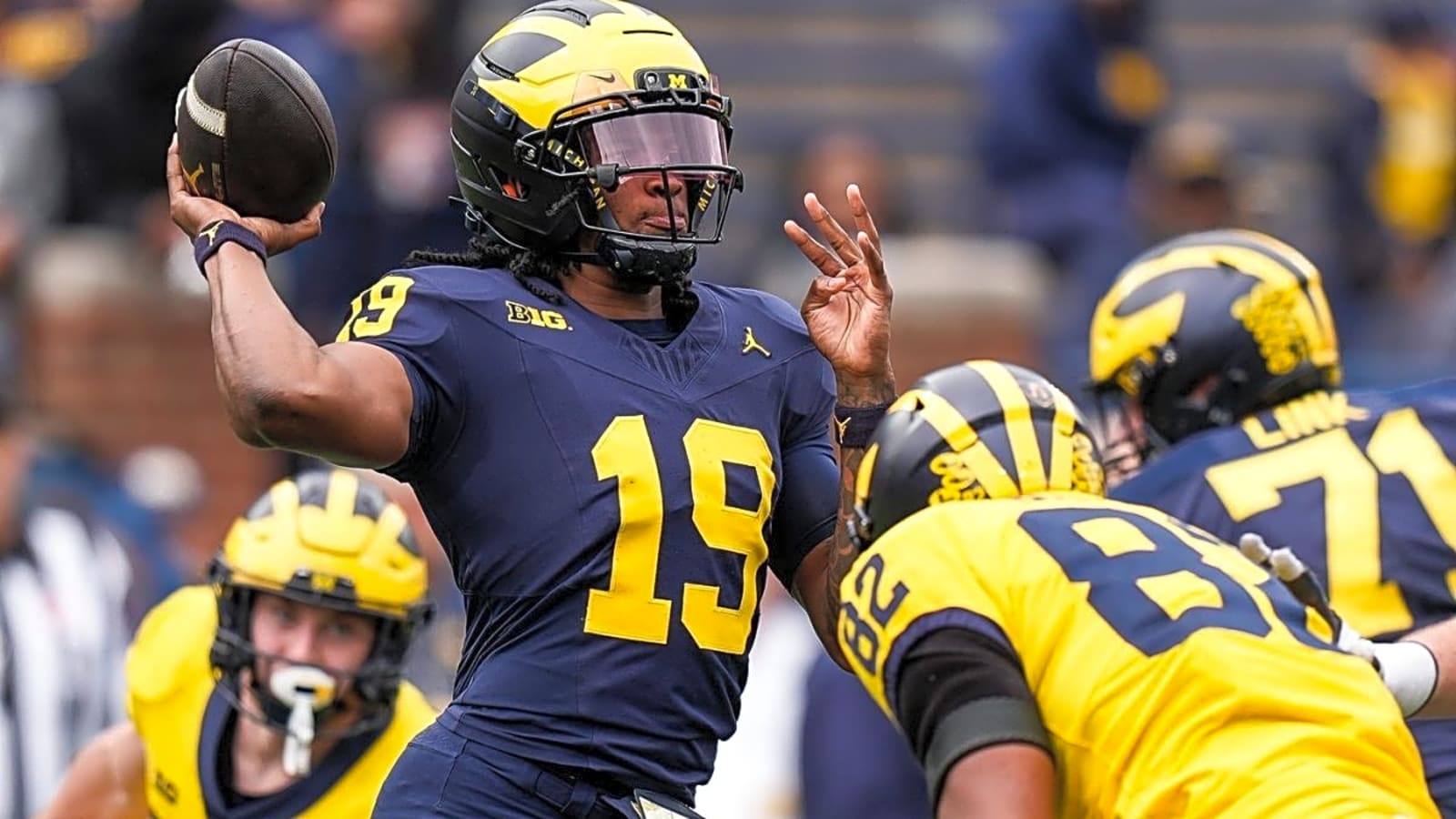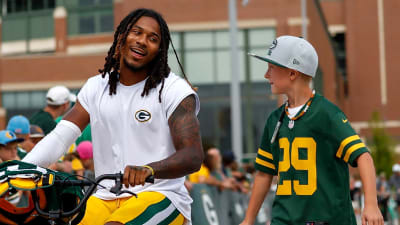
Michigan Wolverines head coach Sherrone Moore has made the decision that many anticipated but few expected to see so soon: five-star freshman Bryce Underwood will be the Wolverines’ starting quarterback when they open the 2025 season against New Mexico on August 30.
The announcement, expected to be made official on Monday, marks a significant moment for both Underwood and the program. Michigan will begin a season with a true freshman quarterback for the first time since Tate Forcier took the reins in 2009, making Underwood just the fourth freshman in school history to earn that distinction.
Michigan Wolverines QB Bryce Underwood
Underwood’s path to this moment began with one of the most dramatic recruiting flips in recent memory. When the Michigan Wolverines successfully convinced the Belleville, Michigan native to decommit from LSU in November 2024, it represented more than just a recruiting victory—it was a statement about the program’s commitment to building around elite talent.
The decision to flip from LSU reportedly came with a significant financial investment, with sources indicating Michigan committed approximately $10 million to secure Underwood’s services. That investment now appears positioned to pay immediate dividends, as the 6-foot-4, 228-pound quarterback has impressed coaches and teammates throughout fall camp.
At Belleville High School, Underwood demonstrated the kind of leadership and performance that made him the consensus top quarterback prospect in the 2024 recruiting class. He led the Tigers to a remarkable 38-game winning streak, including the program’s first-ever undefeated season in 2022. His combination of size, arm talent, and mobility has drawn comparisons to former NFL MVP Cam Newton and Texas legend Vince Young.
Winning a Competitive Battle
Underwood’s ascension to the starting role wasn’t automatic, despite his five-star pedigree and the significant investment in his recruitment. He faced legitimate competition from Fresno State transfer Mikey Keene, who brought 5,868 passing yards and 42 touchdowns from his previous two seasons, and returning quarterback Davis Warren, who helped guide Michigan to victories over Ohio State and Alabama to close the 2024 season.
The fact that Underwood emerged from this competition speaks to both his natural ability and his rapid adaptation to the college game. Sources close to the program indicated that Underwood had been “turning heads” even before preseason practices began, and that momentum continued throughout fall camp.
247Sports director of scouting Andrew Ivins has praised Underwood’s “ideal blend of size, arm talent and athleticism,” physical tools that have translated effectively to the collegiate level. His ability to make throws from multiple arm angles while maintaining mobility in the pocket has given offensive coordinator Kirk Campbell a versatile weapon around which to build the offense.
Addressing Michigan’s Offensive Needs
The decision to start Underwood addresses one of Michigan’s most glaring weaknesses from the 2024 season. The Wolverines ranked 130th out of 134 FBS teams in passing offense, averaging just 129 yards per game through the air. Only the three service academies posted lower passing numbers, a statistic that highlighted the desperate need for improvement in the aerial attack.
Underwood’s skill set should provide immediate upgrades to Michigan’s passing game. His arm strength allows for downfield throws that weren’t consistently available last season, while his mobility creates opportunities for extended plays and impromptu scrambles. The combination of these abilities should open up new dimensions for an offense that relied heavily on its running game and defensive support in 2024.
The supporting cast around Underwood has been significantly upgraded through the transfer portal. Former Alabama running back Justice Haynes, rated as the top transfer running back of the 2025 cycle, provides a dynamic complement to Underwood’s skill set. The addition of experienced receivers and improved offensive line depth should help ease the transition for the freshman quarterback.
Historical Context and Expectations
Michigan’s history with freshman starting quarterbacks provides both encouragement and caution. Rick Leach (1975), Chad Henne (2004), and Tate Forcier (2009) all found varying degrees of success when thrust into starting roles as true freshmen. Henne’s trajectory is perhaps most relevant, as he went on to become a four-year starter and eventual NFL quarterback after beginning his career with a victory over Miami (Ohio).
However, recent college football history suggests that relying on true freshman quarterbacks often comes with growing pains. Nebraska’s Dylan Raiola struggled with consistency last season, throwing 11 interceptions against 13 touchdowns while the Cornhuskers dropped five of their final six regular-season games. UCLA’s experiment with Dante Moore in 2023 ended with a midseason quarterback change.
Underwood may be better positioned for early success than those predecessors due to several factors. Michigan’s defense is projected to be among the nation’s elite units, providing the kind of support that can make life easier for a developing quarterback. The schedule also offers a relatively gentle introduction, with manageable early opponents before Big Ten play intensifies.
The Road Ahead
Bryce Underwood’s inaugural test will come against a New Mexico team picked to finish 11th in the Mountain West under first-year coach Jason Eck. While hardly a daunting opponent, the game will provide valuable insight into how the freshman handles the pressure and pageantry of college football.
The real challenges begin in Week 2, when Michigan travels to Oklahoma for a marquee matchup that will test both Underwood and the revamped offense against quality competition. Following a home game against Central Michigan, the Wolverines open Big Ten play at Nebraska—a game that will be broadcast on CBS and could serve as an early barometer for the program’s ceiling under Moore’s leadership.
Michigan’s conference schedule offers both opportunities and challenges. While they avoid traditional powers Penn State and Oregon, road games at Wisconsin, Northwestern, and Indiana will test the team’s ability to perform away from the friendly confines of Ann Arbor. The season concludes with the annual rivalry game against Ohio State, a contest that could determine both the Big Ten title and College Football Playoff positioning.
Building for the Future
Perhaps most significantly, Bryce Underwood’s appointment as a starter represents Michigan’s commitment to building around elite talent rather than waiting for it to develop. The decision signals confidence not just in Underwood’s current abilities, but in the program’s infrastructure to support and develop a player with his potential.
The investment in Bryce Underwood extends beyond financial considerations to encompass coaching, facilities, and support systems designed to maximize his development. With three years of eligibility remaining after the 2025 season, Underwood represents the cornerstone around which Michigan can build sustained success.
Moore’s willingness to hand the keys to a true freshman also demonstrates the kind of bold decision-making that championship programs require. Rather than playing it safe with an experienced but limited option, Michigan has chosen to bet on upside and potential.
Championship Aspirations
The ultimate measure of Underwood’s impact will be Michigan’s ability to compete for championships during his tenure. The Wolverines won the national title in 2023 with a veteran-laden team built around a dominant rushing attack and elite defense. The 2025 version will feature many of the same defensive strengths while adding the explosive offensive potential that Underwood provides.
College Football Playoff expansion to 12 teams provides additional opportunities for Michigan to compete on the sport’s biggest stage. A strong start to the season could position the Michigan Wolverines for serious playoff consideration, particularly if Underwood’s development accelerates throughout the year.
The pressure accompanying such expectations might overwhelm some freshman quarterbacks, but everything in Underwood’s background suggests he’s prepared for the challenge. His high school success, recruiting pedigree, and early college performance indicate a player ready to embrace the spotlight that comes with leading one of college football’s most storied programs.
As Michigan prepares to embark on the Underwood era, the program finds itself at a fascinating crossroads. The decision to start a true freshman quarterback represents both a calculated risk and a statement of ambition. If Underwood lives up to his considerable potential, the Michigan Wolverines could find themselves back in championship contention sooner than anyone expected. The future of Michigan football may well be in the hands of its newest star.
More must-reads:
- Colorado's Deion Sanders makes season-altering decision before Week 1 game
- How Texas QB Arch Manning can live up to the hype in Week 1 opener against Ohio State
- The 'Most NFL 1,000-receiving yard seasons' quiz
Breaking News
Trending News
Customize Your Newsletter
 +
+
Get the latest news and rumors, customized to your favorite sports and teams. Emailed daily. Always free!








